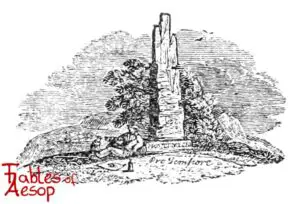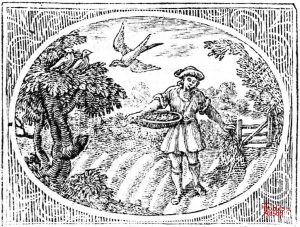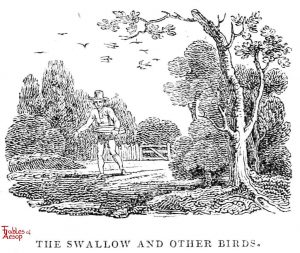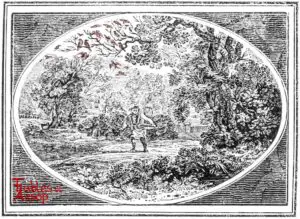Destroy the seed of evil, or it will grow up to your ruin. A Swallow was warned to eat all sown hemp seeds else they grow up; the fibers woven into a net.
Destroy the seed of evil, or it will grow up to your ruin.

Eliot/Jacobs Version
It happened that a Countryman was sowing some hemp seeds in a field where a Swallow and some other birds were hopping about picking up their food. “Beware of that man,” quoth the Swallow. “Why, what is he doing?” said the others. “That is hemp seed he is sowing; be careful to pick up every one of the seeds, or else you will repent it.” The birds paid no heed to the Swallow’s words, and by and by the hemp grew up and was made into cord, and of the cords nets were made, and many a bird that had despised the Swallow’s advice was caught in nets made out of that very hemp. “What did I tell you?” said the Swallow.

JBR Collection
A Farmer, sowing his fields with flax, was observed by a Swallow, who, like the rest of her tribe, had travelled a good deal, and was very clever. Among other things, she knew that of this same flax, when it grew up, nets and snares would be made, to entrap her little friends, the Birds of the country. Hence, she earnestly besought them to help her in picking up and eating the hateful seed, before it had time to spring from the ground. Food of a much nicer kind was, however, then so plentiful, and it was so pleasant to fly about and sing, thinking of nothing, that they paid no attention to her entreaties. By and by the blades of the flax appeared above the ground, and the anxiety of the Swallow was renewed. “It is not yet too late,” said she; “pull it all up, blade by blade, and you may then escape the fate which is otherwise in store for you. You cannot, like me, fly to other countries when danger threatens you here.” The little Birds, however, still took no notice of the Swallow, except to consider her a very troublesome person,” whom silly fears had set beside herself. In the course of time the flax grew, ripened, and was gathered, spun, and made up into nets, as the Swallow had foretold. Many a little Bird thought, in dying, of the Swallow they held to be so crazy. The Swallow, in despair at their thoughtless behaviour, has since preferred the society of men to that of her former companions.

Samuel Croxall
A FARMER was sowing his field with flax. The Swallow observed it; and desired the other birds to assist her in picking the seed up, and destroying it; telling them, that Flax was that pernicious material, of which the thread was composed which made the fowler’s nets, and by that means contributed to the ruin of so many innocent birds. But the poor Swallow, not having the good fortune to be regarded, the flax sprung up, and appeared above the ground. She then put them in mind once more of their impending danger, and wished them to pluck it up in the bud, before it went any farther. They still neglected her warnings; and the flax grew up into the high stalk. She yet again desired them to attack it, for that it was not yet too late. But all that she could get was, to be ridiculed and despised for a silly, pretending prophet. The Swallow, finding all her remonstrances availed nothing, was resolved to leave the society of such unthinking, careless creatures, before it was too late. So, quitting the woods, she repaired to the houses; and, forsaking the conversation of the birds, has ever since made her abode among the dwellings of men.
THE APPLICATION
As men, we should always exercise so much humanity as to endeavour the welfare of mankind, particularly of our acquaintance and relations; and if, by nothing farther, at least by our good advice. When we have done this, and if occasion required, continued to repeat it a second or third time, we shall have acquitted ourselves sufficiently from any imputation upon their miscarriages; and haying nothing more to do, but to separate ourselves from them, that we may not be involved in their ruin, or be supposed to partake of their error. This is an excommunication which reason allows. For, as it would be cruel on the one side, to prosecute and hurt people for being mistaken; so, on the other, it would be indiscreet, and over complaisant, to keep them company through all their wrong notions, and act contrary to our opinion out of pure civility.

Thomas Bewick
A Swallow, observing a Farmer sowing his field with flax, called the Birds together, and informed them what he was about. She told them that flax was the material of which the thread was made that composed the fowler’s nets, so fatal to the feathered race, and strongly advised them to assist her in picking up the seed, and destroying it. The Birds heard her with indifference, and gave themselves no trouble about the matter. In a little time the flax sprung up, and appeared above the ground. She then put them in mind once more of their impending danger, and wished them to pluck it up in the bud, before it grew any farther. But they still slighted her warnings, and the flax grew up into stalk. She again urged them to attack it, for it was not yet too late; but they only ridiculed her for a silly pretending prophet. The Swallow, finding all her remonstrances availed nothing, was resolved to leave the society of such careless unthinking creatures, before it was too late: so quitting the woods, she repaired to the houses; and, forsaking the conversation of the Birds, has ever since taken up her abode among the dwellings of men.
APPLICATION.
Wise men read effects in their causes, and profit by them; but their advice is thrown away when given to the arrogant and self-conceited, who are too proud to listen to it. It is equally lost upon fools, who stupidly or obstinately shut their eyes against impending danger, till it is too late to prevent it. In both cases, those who have no foresight of their own, and those who despise the wholesome admonitions of their friends, deserve to suffer from the misfortunes which their own obstinacy, folly, or negligence, brings upon their heads. A great portion of mankind, from an overweening conceit of their own abilities, are unwilling to be advised by any one, and through this stubborn disposition, deprive themselves of the aids of friendship, and the benefits which the good-will of their more sensible neighbours would have conferred on them with pleasure.


L’Estrange version
There was a country fellow at work a sowing his grounds, and a swallow (being a bird famous for providence and foresight) call’d a company of little birds about her, and bad ’em take good notice what that fellow was a doing. You must know (says the swallow) that all the fowlers nets and snares are made of hemp, or flax; and that’s the seed that he is now a sowing. Pick it up in time for fear of what may come on’t. In short, they put it off, till it took root; and then again, till it was sprung up into the blade. Upon this, the swallow told ’em once for all, that it was not yet too late to prevent the mischief, if they would but bestir themselves, and set heartily about it; but finding that no heed was given to what she said; she e’en bad adieu to her old companions in the woods, and so hetook herself to a city life, and to the conversation of men. This flax and hemp came in time to be gather’d, and wrought, and it was this swallows fortune to see several of the very same birds that she had forewarn’d, taken in nets, made of the very stuff she told them off. They came at last to be sensible of the folly of slipping their opportunity; but they were lost beyond all redemption first.
Moral
Wise men read effects in their causes, but fools will not believe them till ’tis too late to prevent the mischief. Delay in these cases is mortal.

Hirundo et Aviculae
Hirundo, cum linum coeptum esset seri, suadebat aliis aviculis impedire sementem, dictitans omnibus fieri insidias. Irridebant illae garrulamque vocabant. Surgente lino, rursum monebat evellere sata; irridebant iterum. Maturescente lino, hortabatur populari segetem et, cum ne tunc quidem consulentem audirent, hirundo cum homine foedus init cohabitatque cum eo. Ceteris avibus e lino retia fiunt et laquei.
Moral
Multi nec ipsi consulere sibi norunt, nec recte consulentem audiunt sed, cum in periculis versantur, tum demum incipiunt suam damnare socordiam.
Perry #039


